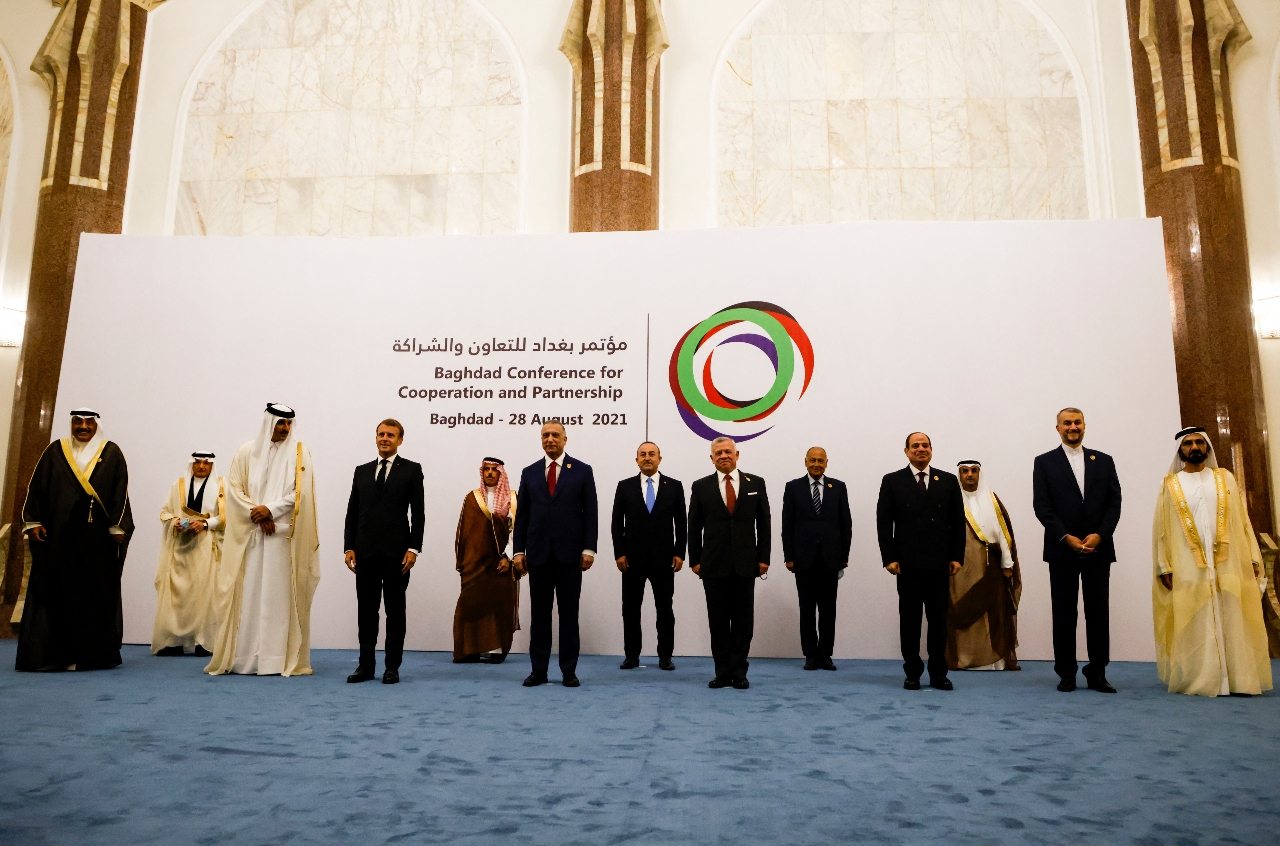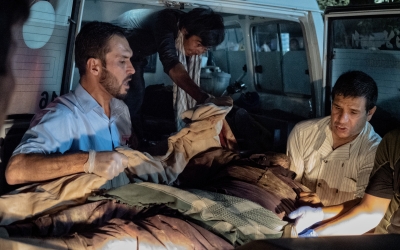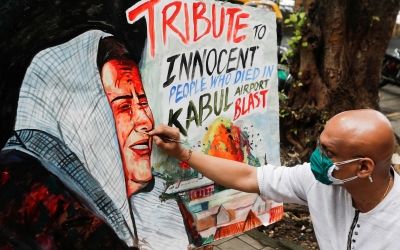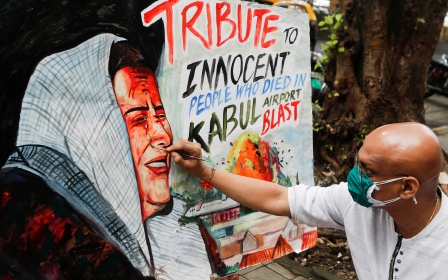Baghdad summit: Egypt's Sisi and the emir of Qatar meet for first time since reconciliation

Egypt's President Abdel Fattah el-Sisi met Qatar's Emir Sheikh Tamim bin Hamad Al Thani in Baghdad on Saturday, the Egyptian presidency said.
This was the first meeting between the two countries since they agreed in January to end a long-running dispute.
Egypt, Saudi Arabia, the United Arab Emirates (UAE), and Bahrain had agreed to end the dispute that saw them boycott Qatar since 2017 over charges it supports terrorism, a charge Doha denies.
The meeting on Saturday came as Iraq hosted a summit in the capital attended by several other regional leaders and French President Emmanuel Macron.
Earlier in the day, Macron had warned of the threat the Islamic State (IS) group posed as the Taliban's takeover of Afghanistan and a deadly bombing in Kabul threatened to overshadow the meeting.
Organisers have given little away about the agenda of the summit, but the meeting also comes as Iraq, long a casualty of IS militancy, tries to establish itself as a mediator between Arab countries and Iran.
"We all know that we must not lower our guard, because Daesh [IS] remains a threat, and I know that the fight against these terrorist groups is a priority of your government," Macron said, after a meeting with Iraqi Prime Minister Mustafa al-Kadhemi in Baghdad.
Iraq and France "are key partners in the war against terrorism," Kadhemi replied.
Along with the Egyptian president and Qatar's emir, Jordan's King Abdullah II and the foreign ministers of regional foes Iran and Saudi Arabia are attending.
The prime minister of the UAE, Sheikh Mohammed bin Rashid Al Maktoum, as well as Kuwait's Prime Minister Sheikh Sabah Al Khalid Al Sabah also joined the talks.
Delicate balancing act
Oil-rich Iraq is seeking to play a "unifying role" to tackle the crises shaking the region, sources close to Kadhemi have said.
It also wants its neighbours to talk to each other instead of settling scores on its territory.
Baghdad has been caught for years in a delicate balancing act between its two main allies, Iran and the United States.
Iran exerts major clout in Iraq through allied armed groups within the Hashd al-Shaabi, a powerful state-sponsored paramilitary network.
Baghdad has been brokering talks since April between US ally Saudi Arabia and Iran on mending ties severed in 2016.
Macron aims to highlight France's role in the region and its determination to press the fight against "terrorism," his office said.
The French president considers Iraq "essential" to stability in the troubled Middle East, he added.
However, organisers said they did not expect any diplomatic breakthroughs at the summit.
"Getting these countries to sit around the table - that will be achievement enough," said one Iraqi government official to Reuters.
'More urgent than ever'
An IS affiliate claimed Thursday's suicide bombing in Kabul that killed scores of people, including 13 US service members.
The attack has revived global concerns that the organisation, which seized swathes of Syria and Iraq before being routed from both countries, is once again an emerging threat, analysts said.
The blast came during the final days of US-led evacuations from Afghanistan after the Taliban's lightning takeover.
"These events show that it has become more urgent than ever to back the political process in Iraq and involve its neighbours," a source close to Macron said.
"A solution to security threats in the region, including Daesh, depends on a stable, sovereign and prosperous Iraq."
A decade after the 2003 US-led invasion that ousted Iraqi President Saddam Hussein, IS in June 2014 announced a "caliphate" in territory seized in Syria and Iraq, routing the badly prepared Iraqi army without a fight and seizing almost a third of the country.
France was part of a US-led coalition established to battle the organisation.
Iraq declared IS territorially defeated in December 2017, but the group still retains sleeper cells and continues to claim bloody attacks.
'Access to tens of millions of dollars'
One of the deadliest was a bombing in July that ripped through a crowded Baghdad market, killing over 30 people on the eve of Eid al-Adha.
According to Colin Clarke, senior research fellow at the Soufan Center, a New York based research centre, IS "still has access to tens of millions of dollars and will likely continue to rebuild its network throughout Iraq and Syria".
Its "primary goal at the moment is to have its affiliates maintain momentum until it can sufficiently rebuild its core in the Levant.
"[IS] affiliates in sub-Saharan Africa and now Afghanistan will have the opportunity to make strides in the coming year."
In July, US President Joe Biden said his country's combat operations in Iraq would end this year, but that US soldiers would continue to train, advise and support its military in the fight against IS.
Washington currently has 2,500 troops deployed to Iraq.
Rasha Al Aqeedi, a senior analyst at the Washington-based Newlines Institute for Strategy and Policy, said coalition forces believed Iraq's security personnel could prevent another IS advance.
"Maybe they're not ideal, but they're good enough for America to leave the country believing that Iraq is not going to live through another 2014," she told AFP.
Middle East Eye propose une couverture et une analyse indépendantes et incomparables du Moyen-Orient, de l’Afrique du Nord et d’autres régions du monde. Pour en savoir plus sur la reprise de ce contenu et les frais qui s’appliquent, veuillez remplir ce formulaire [en anglais]. Pour en savoir plus sur MEE, cliquez ici [en anglais].




